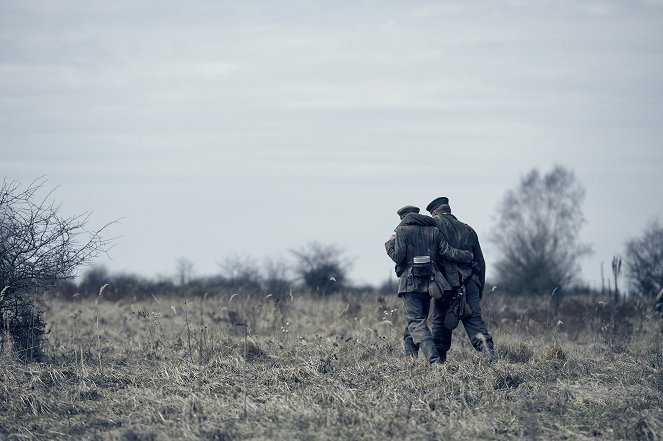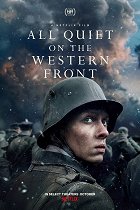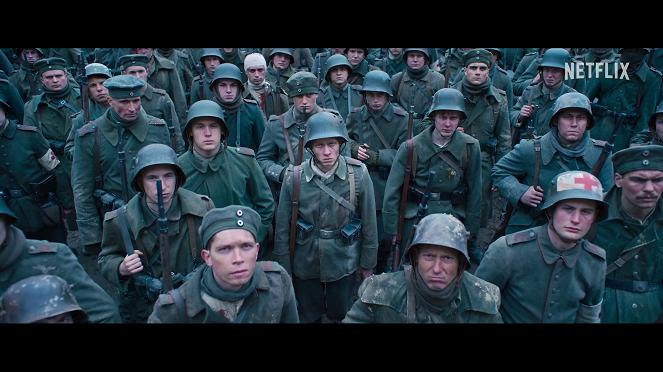Directed by:
Edward BergerCinematography:
James FriendComposer:
Volker BertelmannCast:
Felix Kammerer, Albrecht Schuch, Moritz Klaus, Aaron Hilmer, Adrian Grünewald, Edin Hasanović, Daniel Brühl, Devid Striesow, Sebastian Hülk, Andreas Döhler (more)VOD (1)
Plots(1)
All Quiet on the Western Front tells the gripping story of a young German soldier on the Western Front of World War I. Paul and his comrades experience first-hand how the initial euphoria of war turns into desperation and fear as they fight for their lives, and each other, in the trenches. The film from director Edward Berger is based on the world renowned bestseller of the same name by Erich Maria Remarque. (Netflix)
(more)Videos (4)
Reviews (10)
The repetitive alternation of the heat of battle and the coldness of waiting, the recurring motifs for unimaginative half-wits, the book’s premise stripped of all its compelling scenes, which the film replaces with simple (and sometimes unrealistic) war porn and a completely hollow political storyline. The film fails to approximate Remarque’s insistent humanism except by literally illustrating the conflict of minor and major history, which doesn’t make a lot of sense (the horrors of the First World War didn’t actually consist in the fact that Foch wanted an armistice in six days and the Germans needed to think it over). As an adaptation, this is a disaster, devoid of psychology and with no thoroughly developed characters, and as a film it’s drawn out, transparent and superficial. The versions from 1930 and 1979 had something to them, but this fails even as a stand-alone work. Netflix’s problem isn’t the lack of casting actors of color. Its problem is that its projects lack dramaturgy and thus don’t much sense.
()
An adaptation that isn't afraid to mess with the very foundations of what is rightly a timeless classic and yet it is the most faithful adaptation possible. An established benchmark of how to adapt the written word into film language (not telling and showing), preserving the message and yet "standing up and not being a mere illustration". Everything is subordinated to the suggestive concept of "you are there with them". The absurdity and futility of the war machine through everyday trench existential horror, which, however, in addition to the horrific scenes (through a war scene, through the simple survival without hope for the future), manages to contrast the humanity and unexpected permeations of normality in spite of everything (officers, timelessness, humanity), often without words; purely by sight, sound, suggestion, music. Yes, you could say that it doesn't build up, it just kind of flows during the last days on the front. That’s not very viewer friendly, but it’s the intention, and it works, without being the same over and over again. It cannot be denied that many of the horrors have already been handled equally impressively by other works (but it is hard to accuse the adaptation of the classic on which everyone is based of being "a bit dated"). This is a film that will inevitably divide, some will berate it because "they messed with my beloved book", others because "we've seen this before and we don't need to do it again", others will bemoan "the non-existent pace". And then there'll be those who won't sleep easy as a result, not because of the explicit depictions of wartime atrocities or the topicality "it was a century ago", but for the overall sense of the confusion of it all, even though it makes do with little; perhaps the mere pilgrimage of a uniform from the front.
()
I’ve read the book once in high school and don't remember much of it, I'm not burdened by the demands of faithful adaptation. What I demand of a historical war film, however, is that it somehow expresses its thesis in a meaningful way, which All Quite on the Western Front (and Boredom and Ash) fails to do. There is no character development, no profiling in the opening and no emotion in the scenes where we are supposed to sympathise with the protagonists. The whole thing is mired in the bias of war scenes, of which only the transporter sequence leaves a bigger impression, otherwise every scene from the trenches has the same aesthetic: stick the camera on the protagonist and let it bang around. This is supposed to increase the suggestiveness and perhaps the subjectivity of the experience, but the film soon disproves this by layering melodramatic clichés and haphazardly involving "big stories" from the peace negotiations – by that point, it's already mixing together Come and See (in a weak concoction of the hero's suffering), 1917 (steadicam in the trenches), Paths of Glory (a moral about the futility of human sacrifice and the irrational thinking of generals), and Dunkirk (the role of condensed time during the negotiations, cutting to the impending battle). Together, of course, it's a mess, which mostly looks nice, but the sheer disjointedness of the journey leads to inevitable boredom and tedium. When I checked the progress bar and found that I still had over 40 minutes to go, I almost wanted to turn the film off. Of course, it only takes the basic ideas and motivations from Remarque, I know that, even with the rather clouded memories of the book (and unfortunately that's the least of the problems).
()
In All Quiet on the Westen Front, there is only one shot - a long sequence with an imperceptible travelling forward - where the face of the actor Felix Kammerer (arguably the main character of the movie) appears in full screen, in its absolute and preserved peacefulness. The viewers understand he has just been passing, in the franco-german trenches, ironically by the exact time of enactment of the Armistice. Edward Berger seems to tell us: Death is beautiful. Yes it can be so after more than two hours of tragic absurd and dreadful description of events seen from the exclusive point of view of the (German) losers of the First World War, where no death is spared to the viewers. And where so many young men fell to their death or became orendously mutilated in the name and for the honour of their country and its political and military leaders. Such a unique waste may be alluded to by Edouard Berger in the first scene of the movie, filmed in a low angle, of a mother fox and her babies, warmly pressed against each other below earth in their burrow. Only human animals can find in themselves the will, strength and illusion of fighting till death for an abstract political concept such as that of territorial homeland. We are thus reminded of those so-called "primitive" societies that were shedding tears upon the birth of any new born child, in anticipation of the difficulties and challenges to come that she or he would have to face later on in life. And, as can be expected from said people, the members of these tribes were celebrating joyfully the passing of any of them, as a testimony of the end of earthly hardships for the deceased. And in between birth and death, according to what may be one of the meaning of this movie, there is only cynism. No place for any hope of redemption for any of its characters, all passively blown away by the craziness of war. At the end ,what remains is the impression of a too long and familiar scenario of the same senselessness . The quality of the photography by James Friend is to be highlighted.
()
I have to start by saying what a pity it is that the film went directly to Netflix and not to cinemas. It was not as immersive an audiovisual experience as 1917 or Dunkirk, but still, many scenes would have been great on the big screen. I was a little hesitant to see the film at first, but I was surprised to learn it was nominated in nine categories for the Academy Awards, so I had to see for myself. Although the film is called All Quiet on the Western Front, it is a rather loose adaptation, which I personally didn't mind; the source material matter may have been viewed from a slightly different perspective, with an emphasis on the contrast between the "insignificant" soldiers in the sodden trenches with no food and the "big" men in the heat with plenty of food, but the basic ideas of the horrors and futility of war, as well as the stolen youth at the expense of "higher" goals, are present. I commend the film's reliance on rather unknown faces in most cases, though in the case of the protagonist I kept thinking about Rupert Grint. Although the film is nearly two and a half hours long, it managed to keep me engaged for the entire running time (the soundtrack, which was at times very dissonant to my ears, was harder to get used to), whether it was the realistically rendered and frightening shots of the front line (the arrival of tanks, flamethrowers and the flooded hole sequence will stay in my head for some time to come), the banter among comrades, or the theft of poultry. But the nine nominations seem excessive, even though the result is (at least technically) a fine film.
()
Gallery (35)
Photo © Netflix / Reiner Bajo



Ads